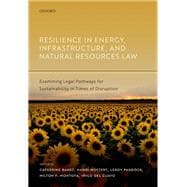The number of severe and sometimes catastrophic disruptive events has been rapidly increasing. Extreme weather events including floods, wildfires, hurricanes, and other natural disasters have become both more frequent and more severe, whilst events such as the COVID-19 pandemic represent a global threat to public health with huge economic effects that recovery packages tried to address. These disruptive events, alone and in combination, have dramatic consequences on nature, human life, and the economy, calling for urgent action to mitigate their causes and adapt to their impacts.
In response to discourses of collapsology and end-of-growth theories, this monograph offers an analytical approach to developing legal responses that can help ensure the needs of present and future generations can be met through energy systems, infrastructure development, and natural resources management in these times of disruption. 'Resilience' is, therefore, seen as a common framework for the interpretation and development of energy, infrastructure, and natural resources law.
With a mix of thematic chapters and case studies from multiple jurisdictions, Resilience in Energy, Infrastructure, and Natural Resources Law maps and assesses legal responses to disruptive nature-based events, and examines possible legal pathways for more sustainable outcomes, based on its engagement with this concept of 'resilience' and social-ecological thinking.








